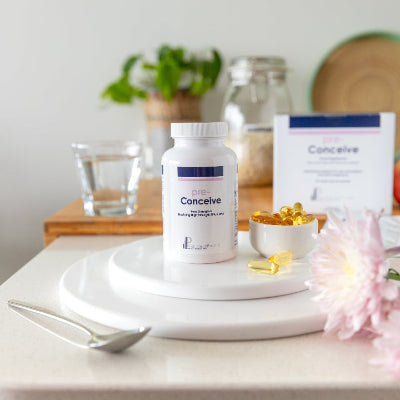In vitro fertilisation (IVF) is both a medical and emotional journey, one that places significant physical demands on the body. While technology handles the science of fertilisation, nutrition supports the biology that makes IVF successful.
A well-structured, nutrient-rich diet can improve egg and sperm quality, optimise hormonal balance, reduce inflammation, and even enhance implantation rates. Emerging research shows that what you eat in the months before and during IVF may meaningfully influence outcomes.
This guide explores the most important nutrients, foods, and lifestyle strategies to help your body thrive during assisted conception.
The Science Behind Nutrition and IVF
IVF involves controlled ovarian stimulation, egg retrieval, fertilisation, and embryo transfer. Each stage relies on optimal cellular function, hormonal regulation, and metabolic support — all of which depend on nutrition.
Key Biological Pathways Affected by Nutrition:
- Oxidative balance: Antioxidants protect eggs and sperm from free radical damage.
- Inflammation control: Omega-3s and phytonutrients promote an anti-inflammatory environment.
- Hormone metabolism: B vitamins, healthy fats, and minerals support oestrogen and progesterone balance.
- Methylation and DNA synthesis: Folate, B12, and zinc contribute to healthy cell division and embryo development.
A nutrient-dense diet creates the biochemical conditions that enhance egg quality, embryo viability, and uterine receptivity, the foundation of IVF success.
The IVF-Friendly Nutrient Plan
Folate (Vitamin B9)
- Role: Crucial for DNA synthesis, cell division, and embryo development. Prevents neural tube defects.
- Sources: Leafy greens (spinach, kale), lentils, asparagus, citrus fruits, fortified grains.
- Recommendation: 400µg/day (methylated folate is preferred for those with MTHFR gene variants).
- Research: Studies show higher preconception folate intake correlates with increased implantation and live birth rates in IVF cycles.
Vitamin D
- Role: Supports ovarian follicle development, immune regulation, and endometrial receptivity.
- Sources: Fatty fish, fortified dairy, eggs, and sunlight exposure.
- Recommendation: At least, 1,000 IU/day (some individuals may require higher doses based on blood tests).
- Evidence: Women with sufficient vitamin D levels, have higher pregnancy and live birth rates after IVF.
Omega-3 Fatty Acids (DHA & EPA)
- Role: Improve egg quality, reduce inflammation, and support hormone balance.
- Sources: Salmon, sardines, flaxseed, chia seeds, walnuts.
- Recommendation: 2,000mg/day of Omega-3, with sufficient DHA and EPA.
- Mechanism: Omega-3s enhance follicular fluid composition, making the microenvironment more favourable for fertilisation.
Coenzyme Q10 (CoQ10)
- Role: A mitochondrial nutrient that boosts energy production in eggs and sperm, helping counteract age-related decline in egg quality.
- Sources: Organ meats, fatty fish, whole grains; often supplemented.
- Dosage: 100 - 300 mg/day (ubiquinol form has superior absorption).
- Scientific insight: CoQ10 enhances mitochondrial efficiency in oocytes, leading to improved embryo quality in IVF patients over 35.
Iron
- Role: Supports red blood cell production and oxygen delivery to reproductive tissues.
- Sources: Lean red meat, lentils, spinach, quinoa, fortified cereals.
- Recommendation: 14 - 27 mg/day.
- Note: Iron deficiency is linked to poor ovarian response and increased fatigue during IVF cycles.
Zinc
- Role: Essential for ovulation, fertilisation, and embryo development.
- Sources: Oysters, nuts, pumpkin seeds, chickpeas, red meat.
- Recommendation: 15+ mg/day.
- Scientific note: Zinc interacts with over 300 enzymes, many of which regulate reproductive hormone pathways.
Antioxidants (Vitamins C, E, Selenium)
- Role: Neutralise oxidative stress, protecting egg and sperm DNA.
- Sources: Citrus fruits, nuts, seeds, berries, avocados, green tea.
- Combined effect: Antioxidant-rich diets are associated with higher fertilisation and blastocyst formation rates during IVF.
Protein and Amino Acids
- Role: Provide the building blocks for hormones and tissues.
- Sources: Eggs, poultry, fish, beans, lentils, Greek yogurt.
- Evidence: Balanced protein intake supports better ovarian response to stimulation and healthier endometrial thickness. Protein supplies key amin acids like Arginine, Cysteine, Carnitine, etc.
Mind-Body and Lifestyle Factors
Nutritional support works best alongside balanced lifestyle habits that enhance IVF outcomes:
- Manage stress: Chronic cortisol elevation can disrupt hormonal signalling. Mindfulness, yoga, and acupuncture improve IVF success rates.
- Sleep 7–8 hours nightly: Rest supports hormone regulation and egg maturation.
- Exercise moderately: Light to moderate movement (like brisk walking) boosts circulation to reproductive organs.
- Avoid toxins: Limit alcohol, smoking, and exposure to BPA, pesticides, and trans fats.
- Plan ahead: Begin nutritional optimisation at least 3 months before IVF, aligning with the egg and sperm maturation cycle.
Supplementation Considerations
Even with a healthy diet, IVF candidates often benefit from targeted supplements:
- Prenatal multivitamin with methylated folate and B12
- Omega-3
- CoQ10
- Vitamin D3
- Zinc and antioxidants for cellular protection.
Why consider pre-Conceive?
IVF is a powerful blend of science and biology, and nutrition bridges the two. The right nutrient plan strengthens your reproductive foundation, supports hormone and mitochondrial health, and prepares your body to sustain a healthy pregnancy.
While IVF technology assists conception, your nutritional choices nurture it, turning each meal into a meaningful act of support on your fertility journey.






